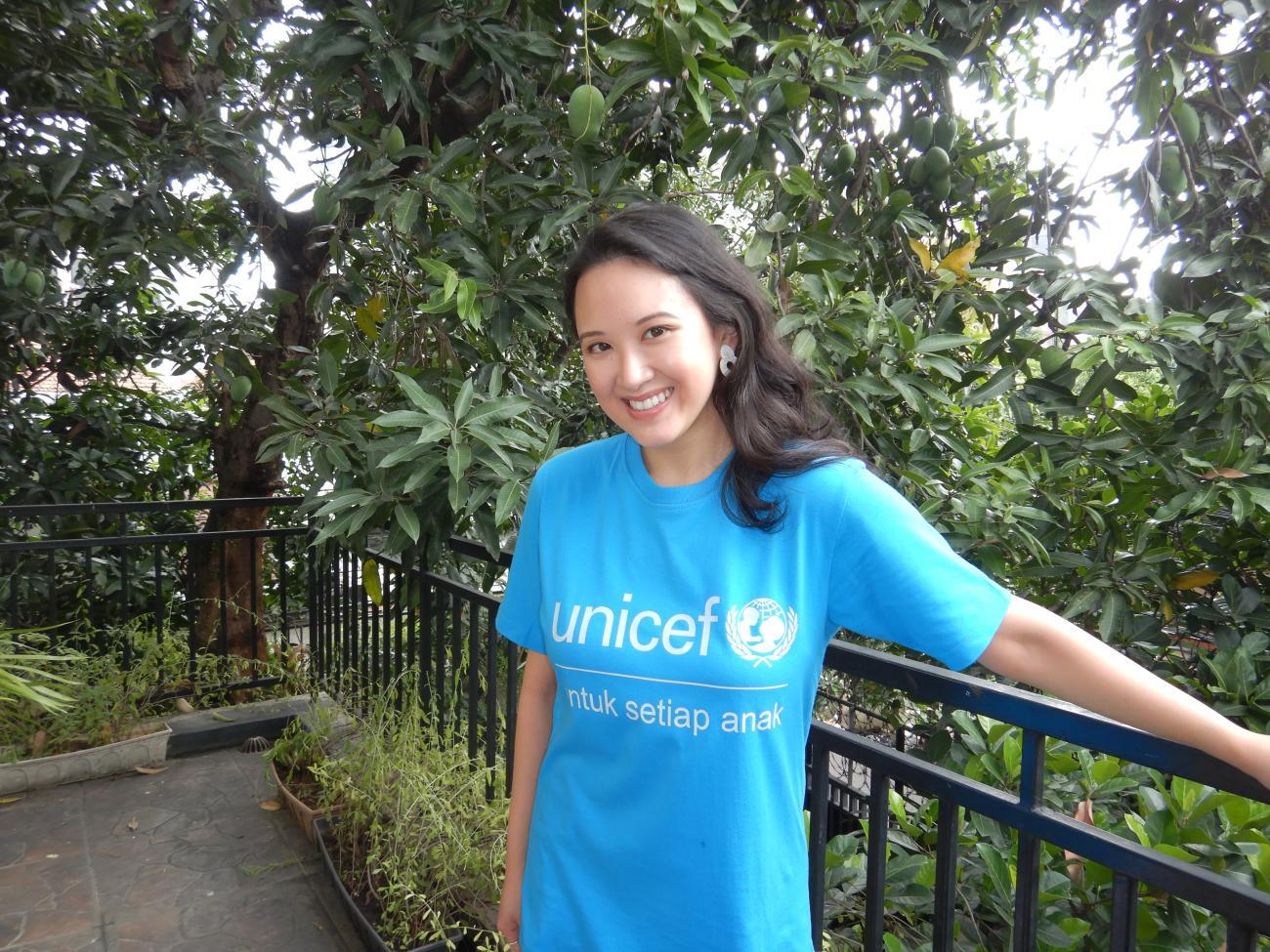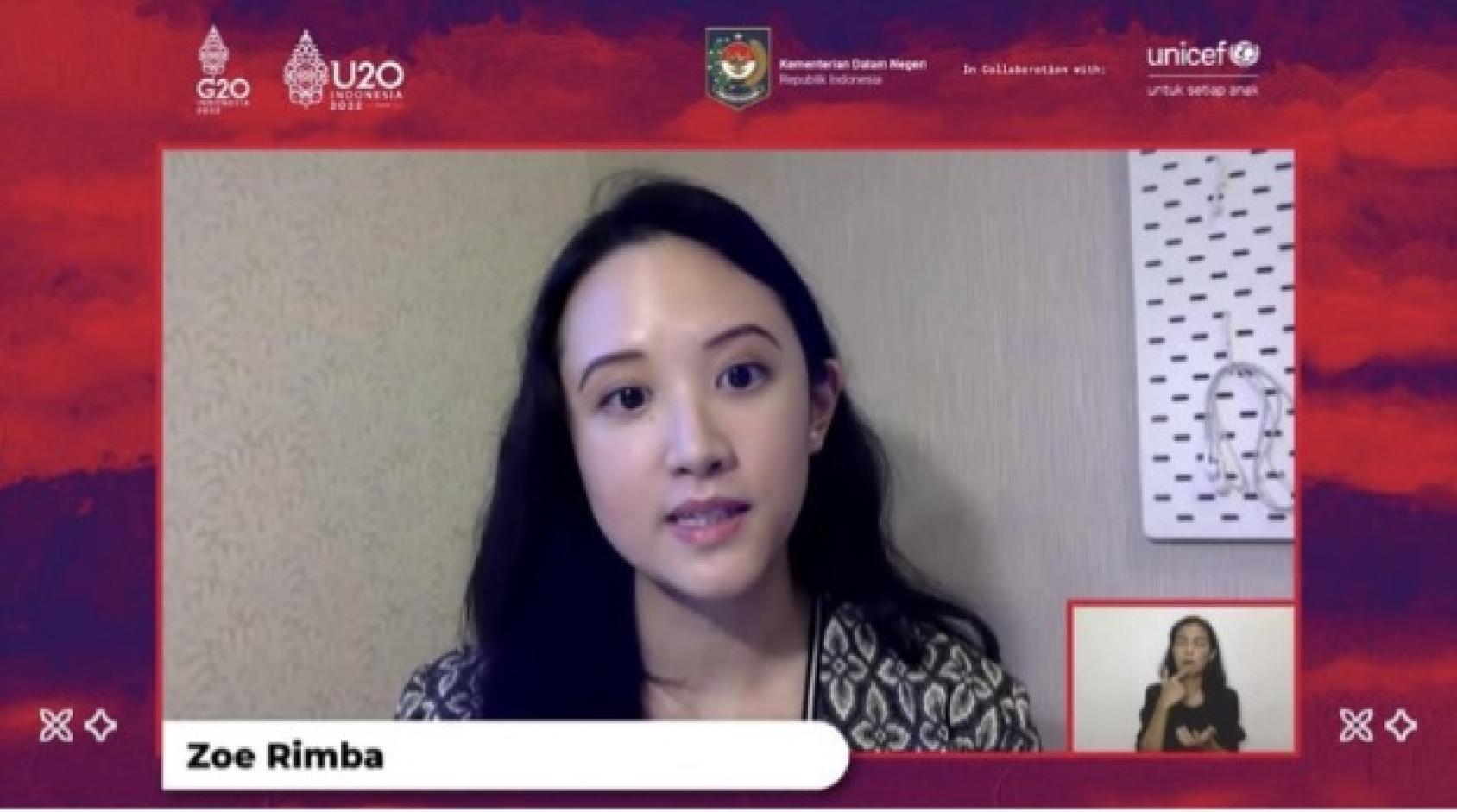In Indonesia, volunteerism means living a life in service of others

Nelson Mandela International Day is marked every year on 18 July in recognition of the former President of South Africa’s contribution to the culture of peace and freedom and his dedication to the service of humanity. The day not only encourages us to reflect on Nelson Mandela’s commitment to the promotion of human rights, gender equality and social justice, but also reminds us that we all have the ability and responsibility to change the world for the better. Volunteerism is an important part of creating a more equal and inclusive future for communities around the world. As we prepare to celebrate the legacy of Nelson Mandela, we follow the story of one young volunteer from UNICEF Indonesia who is carrying the spirit of community forward.
One hot and humid summer day in 2019, Zoe Rimba was standing in front UNICEF’s Headquarters in New York as an international graduate student. She had just completed her studies in international and community development and was about to return to Indonesia. In that moment, she was thinking about what a privilege it would be to one day work for an organization which stands up for the rights of children and young people all over the world.
At the time, Zoe had just left school. She was ambitious, idealistic, and eager to apply the lessons she had learned for the good of others. But she was also uncertain about the future. Could she really be a part of the solution? How was she going to put her ideas and ambitions into action? Although she didn’t have all the answers, she knew that she wanted to do something meaningful for the women and children who are living in remote and underserved areas of Indonesia.
Two years later, Zoe found herself serving as United Nations Volunteer (UNV) for UNICEF Indonesia, helping to support some of the 11 provinces still considered to “disadvantaged areas” by the Indonesian Government.
Together with the Government of Indonesia, the UN Indonesia country team, which comprises UNICEF and 21 other UN entities, is tackling four main areas as highlighted in their Sustainable Development Cooperation Framework Agreement for 2021-2025. They are: (i) Inclusive Human Development; (ii) Economic Transformation; (iii) Green Development, Climate Change and Natural Disasters; and (iv) Innovation to Accelerate Progress towards the SDGs.
Zoe’s main role as a Subnational Planning Officer is to support UNICEF Indonesia’s urban and subnational planning and budgeting programs for children.
“We need to develop structures and systems for sustained participation of children and young people in policy making and decision-making processes. The key objective is to influence national government policies on planning and budgeting to reflect the voices, needs, and rights of children,” Zoe explains.
This approach towards urban programming for children is two-pronged. First of all, Zoe’s team are working to strengthen governmental systems around planning and budgeting through evidence-generation, capacity building activities, and advocacy. Second, they are also working directly with children, adolescents, and young people to increase their participation in policy making and decision-making process through participation platforms like the Musrenbang (Public Participation in Planning and Budgeting) and Forum Anak (Child Forum).

2022 is a historical year for UNICEF Indonesia as it is preparing to support several global events including the Indonesian G20 Presidency. Zoe is part of the team which is helping to plan and coordinate the Urban 20; a platform which encourages dialogue and discussion between the different countries and cities of the G20.
For the Urban 20, Zoe has helped the Social Policy team plan a webinar on “A Common Framework: Towards Child-Friendly Cities Amid the COVID-19 Pandemic, Climate Crisis, and Rising Structural Inequalities”, from drafting the concept note and terms of reference, preparing the event rundown, to liaising with the event organizer. She was also asked to represent UNICEF Indonesia as one of the speakers in a session where she presented “Children in Urban Settings in Indonesia” to over 300 hundred people in the audience.
After over a year serving with UNICEF Indonesia, Zoe feels more hopeful about the future of cities around the world. She is glad that UNICEF Indonesia is emphasizing the importance of working with and for children, especially during a global pandemic, climate crisis, and rising structural inequalities.
There is an old saying that it takes a whole village to raise a child. The same is true for creating inclusive and sustainable cities that work for all children regardless of their socio-economic, cultural, and religious backgrounds. It requires a whole-of-society approach, with everyone playing a role. For Zoe, this is why the spirit of volunteerism must be carried forward.
“Volunteerism to me means living a life of service to others. It also means putting yourself in the other person’s shoes. I hope that more volunteers across Indonesia and around the world will join us as we serve our country and the global community as changemakers, and produce results that last for generations to come.”
This piece was adapted from a story originally published by UN Indonesia. Editorial support provided by the UN Development Coordination Office (DCO). To learn more about the work of the UN in Indonesia, visit: Indonesia.UN.org.





































